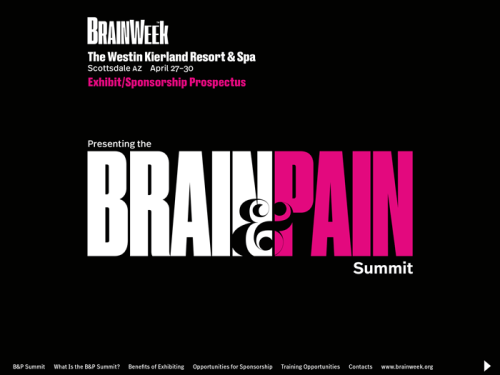BRAIN & PAIN Summit 2023
April 27-30, 2023
This conference will provide 15+ CE/CME credits hours
Register today for only $299!
Westin Kierland Resort & Spa
6902 E Greenway Pkwy
Scottsdale, AZ 85254
In a Hurry?
Try our new express registration. Complete a simple registration now and update your profile later!
Program Information
The BRAIN & PAIN Summit 2023 will convene April 27-30 at the prestigious Westin Kierland Resort & Spa in Scottsdale, Arizona. The agenda has been developed to address the most frequently treated CNS conditions seen by specialists and frontline clinicians. The 4-day conference will present 15+ CME/CE credit hours. Book the package! It includes Summit registration, 3 nights at the Kierland, taxes and resort fees. You’ll save $100 by booking everything together now!
The current estimated annual cost to American society of just nine of the most common neurological diseases is staggering, totaling $789 billion. These conditions include Alzheimer’s disease and other dementias, low back pain, stroke, traumatic brain injury, migraine, epilepsy, multiple sclerosis, spinal cord injury, and Parkinson’s disease.
Gooch CL, Pracht E, Borenstein AR. The burden of neurological disease in the United States: a summary report and call to action. Ann Neurol. 2017;81:479-484.
Event Faculty
Faculty subject to change.
Conference Agenda
Faculty and courses are subject to change. The online schedule below has the most up to date information.
Click on the + signs within the agenda to view the course description, UAN number, and AANP pharmacology credits.
*Not certified for credit
Migraine is a complex disorder of the nervous system that is recurrent and causes significant disability. In fact, it is the second most common cause of disability worldwide. Migraine attacks can occur unpredictably and are a major cause of missed time from work and other activities. The impact of migraine is staggering, affecting about 40 million Americans. Women have a significantly increased risk, and almost 1 in 5 are affected. Because migraine is often genetically transmitted, families may be impacted. This course will look at current diagnosis and secondary headache causes, cover what migraine is, and look at the common evolution of a migraine attack. Also to be discussed: the current classifications of migraine and what they mean in terms of disability and treatment, and the evolution of the understanding of migraine pathology and how it has introduced newer interventions for this patient population. Older theories will be covered, as well as what is understood today and the importance of CGRP, the risk factors for chronification of migraine, and how to take a headache history.
Faculty: Merle Diamond, MD
Bereavement is the state of being deprived of something or someone, resulting in grief, an emotion which can draw one toward the something or someone missing. While the experience of social loss is universal, each person’s individual grief is unique, and the path to returning to a life of satisfaction requires arduous work. This course will review the characteristics of grief, describe empirical studies validating models of grief, and define the construct of Prolonged Grief Disorder—newly listed in the Diagnostic and Statistical Manual of Mental Disorders, the American Psychiatric Association’s handbook for mental health disorders. In addition, a summary of treatment trials for complicated grief, along with a framework for grief work, will be provided.
Faculty: Michael R. Clark, MD
Migraineurs need preventive treatment and learners will find out who and why as pharmacological treatments are discussed, along with neuromodulating devices, supplements, and lifestyle interventions. Migraine treatment has evolved dramatically in the past 5 years and, because of this, migraine patients have experienced better outcomes with fewer side effects. It is important to look at what prevention outcome goals are and how to can track them. Even though older treatments were fraught with tolerability issues and patient compliance, it is important to understand them. Older therapeutic agents, clinical data, and how to utilize the information will be addressed. The rating system for migraine prevention medicines, formulated by scientific data, will be explored. In the past several years there have been changes to preventative migraine treatments, including botulinum toxin for chronic migraine and the advent of monoclonal antibodies to CGRP and GPANTS.
Faculty: Merle Diamond, MD
Embark on a journey to uncover the cultural, scientific, and political history of psychedelics. This course will delve into their early use by indigenous natives to the modern resurgence in use among scholars. What are the basic mechanisms behind the profound effects of these substances on the human brain and psyche? It’s important to understand as much as possible as psychedelic medicine continues to gain mainstream acceptance. History is being made! Join us on this exciting expedition as we explore the new frontier of psychedelic medicine and its potential to transform our understanding of mental health and wellbeing.
Faculty: Eugene Vortsman, DO
This portion of the Migraine Track will dive into acute treatment options for patients struggling with migraine attacks. The course will review traditional tools and their most appropriate application for acute migraine attack management, and explore newer options for treatment, including oral, injectable, infused, and even nonpharmacologic tools available for patients in need of care. After reviewing efficacy and tolerability data, literature surrounding patient preference, and organizational position statements in headache treatment, best practices will be explored, including how to avoid common missteps that can lead to unintended consequences—medication overuse headaches, poor therapeutic outcomes, and even dependence issues with medications. The session will offer actionable choices a prescriber can utilize to best drive the strongest possible patient focused clinical outcomes when treating acute migraine attacks.
Faculty: Merle Diamond, MD
Narcolepsy is a chronic neurological condition characterized by pervasive, excessive daytime sleepiness, as well as the abnormal intrusion of rapid eye movement sleep into wakefulness. Narcolepsy type I, or hypocretin deficiency syndrome, also includes cataplexy, where there is a sudden loss of skeletal muscle tone during wakefulness, and is often triggered by a strong emotion, such as laughter, surprise, or anger. Other symptoms of narcolepsy include fragmented or disturbed nighttime sleep, sleep paralysis, and hallucinations, either when falling asleep (hypnagogic) or when waking up (hypnopompic). The evaluation of people with suspected narcolepsy requires meticulous clinical history taking, validating the patient’s sleep duration and regularity, and assessment of patients for conditions that could also present with hypersomnia such as insufficient sleep and delayed sleep phase disorder, depression, and obstructive sleep apnea. Management of people for narcolepsy includes lifestyle modification, short and strategic shift power naps, as well as a variety of pharmacologic agents to improve daytime sleepiness, episodes of cataplexy, and sleep fragmentation at night. The lecture will review all aspects of narcolepsy, defining its unique features, differential diagnosis, and strategies for evaluation, management, and patient advocacy.
Faculty: Alon Y. Avidan, MD, MPH
Faculty: Jay Salpekar, MD
Complex nocturnal behaviors are some of the most fascinating sleep disorders in medical practice and often include a variety of conditions that require detective work. Parasomnias can include both simple and complex abnormal behaviors and are defined as abnormal sensory or behavioral phenomena that manifest during sleep-wake transition. Parasomnias are divided into those that occur during rapid eye movement (REM) sleep (including nightmares, isolated sleep paralysis, and REM sleep behavior disorder or RBD) and those occurring during nonrapid eye movement (NREM) sleep (such as sleepwalking, sleep terrors, and confusion on arousal. RBD often precedes the onset of neurodegenerative conditions, particularly α-synucleinopathies, a group of neurodegenerative diseases characterized by abnormal accumulation of insoluble α-synuclein in neurons and glial cells, comprising Parkinson’s disease, dementia with Lewy bodies, and multiple system atrophy. Other forms of complex behaviors include motor behaviors of sleep, such as rhythmic movements disorder, periodic leg moments of sleep, and bruxism. Sleep related epilepsy may resemble parasomnias but tend to be monomorphic and stereotyped. The lecture will provide insight into the differential diagnosis using video examples covering the unique features of the key parasomnias, their unique features, and management strategies.
Faculty: Alon Y. Avidan, MD, MPH
Cannabinoids are varied in terms of products available and have multiple roles in the central nervous system. During this session, an updated overview of the endocannabinoid system and potential targets of therapeutic agents will be provided. Epilepsy is a common illness that has proven to improve with use of cannabinoids. Treatment approaches are challenging given the lack of available data and the uncertain quality of products. However, the therapeutic potential of these agents for epilepsy and in other conditions is vast and will be explored during this section.
Faculty: Jay Salpekar, MD
How can you help your patients sleep better, especially those who report poor sleep in the context of co-occurring neurological and psychiatric conditions? This session offers evidence based recommendations for improving your patients’ sleep, along with biological reasons to help motivate patients to actually implement the strategies suggested. After this session, attendees will be able to assess how cognitive behavioral therapy for insomnia (CBT-I) fits into the larger category of behavioral sleep medicine (BSM). Also be discussed: the role circadian biology, sleep drive, and stress response play in sleep, and specific sleep and circadian targets for improving sleep in the context of co-occurring neurological conditions and psychiatric disorders.
Faculty: Fiona Barwick, PhD
Information coming soon.
The spectrum of psychotic symptoms in Parkinson’s disease may can include disordered thinking, hallucinations—auditory, visual, olfactory, gustatory, tactile—delusions, and/or agitation. According to estimates from the Parkinson’s Foundation Prevalence Project, 1.2 million people in the United States will be living with PD by the year 2030. This course will provide a summary of symptoms, along with strategies for efficient differential diagnosis and detection. Best-evidence treatment strategies will be outlined and discussed.
Faculty: Gregory Pontone, MD
Acute repetitive seizures (cluster seizures) and prolonged seizures are common in both childhood and adult epilepsy, and can be life threatening. This session will identify those is at greatest risk for prolonged or repetitive seizures and review updates on treatment options. That information will be applied to cases, and practical rescue plans for patients will be discussed.
Faculty: David Spencer, MD
Osteoarthritis (OA) pain complaints are among the most common encountered by a clinician in an ambulatory care practice. Many clinicians, however, lack up-to-date knowledge about proper staged management of this condition. This course will cover concepts of evaluation, including appropriate and directed history and basic exam and imaging findings that should be appraised when patients present with joint pain. We will discuss proven and unproven commonly accepted management methods for pain in OA and review the medical literature related to various therapies, both conservative and interventional, for its management. Also to be reviewed: evidence and indications for newer OA pain management therapies including regenerative injection therapy approaches.
Faculty: Ramon Cuevas-Trisan, MD
Parkinson’s disease is diagnosed in about 60,000 Americans each year; over 10 million people worldwide live with it. This session will describe the most common motor complications in Parkinson’s disease. Factors that contribute to the emergence of on-off fluctuations will be reviewed, along with potential therapies.
Faculty: Gregory M. Pontone, MD
Faculty: Fiona Barwick, PhD
Epilepsy is a common neurologic disorder that can greatly affect a person’s health and well-being. While many patients can be successfully treated with medication, about a third of patients with epilepsy become refractory to medical treatment. When this happens, the next step is to consider nonmedication options. This course will look at diagnosis and treatment of patients with epilepsy with a special focus on next steps in the evaluation and management of patients with refractory epilepsy and the use of devices and neurostimulation in this population.
Faculty: Sarah Kelley, MD
Ketamine was developed in 1962 as a less hallucinogenic and shorter acting anesthetic agent than phencyclidine. It was first used in humans in 1964. Since then, ketamine has been used for a variety of purposes, including the management of acute pain, chronic pain, and depression. The history of ketamine will be examined, and the current evidence available supporting its use in chronic pain and depression will be presented.
Faculty: Kiran Patel, MD
Pain associated with diabetic peripheral neuropathy can be disabling and difficult to manage. Reported pain is on the rise. Avoidance—by preventing/delaying the onset of diabetes—whenever possible, is critical. Proven effective treatments only help some patients with the condition. Management recommendations have evolved over the last 10 years based on newer agents and more medical evidence showing efficacy of some agents and lack of efficacy of others, challenging traditional paradigms. Medical evidence will be presented for various pharmacotherapy options, exercise, and minimally invasive treatment options. The practical selection of management methods depends on various factors including other medical conditions, cost, and experience of the patient’s provider.
Faculty: Ramon Cuevas-Trisan, MD
Event Registration
We respect the value of your time and the complexities of arranging coverage for conference travel. At the BRAIN & PAIN Summit, you can experience the significance of peer-to-peer learning and earn 15+ CME/CE credit hours for this event.
**In addition to registration to the 4 day BRAIN & PAIN Summit, the hotel package includes a 3 night stay at the Westin Kierland Resort & Spa.
Conference Venue
Westin Kierland Resort & Spa
6902 E Greenway Pkwy
Scottsdale, AZ 85254

This 4 star hotel is a serene oasis in the Sonoran Desert and is near dining and shopping at Kierland Commons. After all that learning, treat yourself to the golf club and an award-winning course designed by local architect Scott Miller. Plan to bring the kids? The OdySea Aquarium is nearby. Need a break from everything? Why not have a facial, massage, mani/pedi at Agave, The Arizona Spa & Salon. With Heavenly® Beds, high-speed internet access, complimentary bottled water, a coffee maker, a work desk, and flat screen TV to stream a movie, you can have it all!
Conference Accreditation
Target Audience
The educational design of this activity addresses the needs of physicians, nurses, nurse practitioners, pharmacists, physician associates, psychologists, and allied HCPs who treat patients with various pain and/or neurological conditions.
Statement of Need/Program Overview
The BRAIN & PAIN Summit is a 3 1/2-day conference presenting 18.0 accredited CE hours developed for clinicians treating pain and other CNS conditions. Topic areas include, but are not limited to, dementia, epilepsy, sleep, stroke,movement and neurodegenerative disorders, CNS and PNS related pain conditions.
Educational Objectives
After completing this activity, the participant should be better able to:
1. Summarize the incidence rate and etiology of prevailing CNS disorders and chronic pain conditions
2. Describe reasons why differential diagnosis is imperative for CNS conditions and chronic pain disorders
3. Identify the social, economic, and health impacts of chronic pain and CNS disorders on both patients and caregivers
4. Recognize clinical pearls for varying disease states in the CNS and pain spaces
5. Recall approved and emerging therapies for CNS and pain disorders
Faculty
- Alon Avidan, MD, MPH: Director, UCLA Sleep Disorders Center
- David Spencer, MD: Professor Of Neurology
- Eugene Vortsman, DO: Clinical Director Of Addiction Medicine And Disease Management
- Fiona Barwick, PhD, DBSM: Clinical Associate Professor
- Gregory M. Pontone, MD: Neuropsychiatry, Associate Professor
- Jay Salpekar, MD, FANPA, FAES, DFAACAP: Associate Professor Of Psychiatry And Neurology
- Kiran Patel, MD: Interventional Pain Medicine Specialist
- Merle Diamond, MD: President, Medical Director
- Michael R. Clark, MD, MPH, MBA: Professor Of Psychiatry And Behavioral Sciences
- Ramon Cuevas-Trisan, MD: Associate Chief Of Staff For Education & Research
- Sarah Kelley, MD: Director, Pediatric Epilepsy Monitoring Unit
Program Agenda
https://www.brainweek.org/brain-pain-summit-2023/#Agenda
Physician Accreditation Statement
This activity has been planned and implemented in accordance with the accreditation requirements and policies of the Accreditation Council for Continuing Medical Education (ACCME) through the joint providership of Global Education Group (Global) and BRAINWeek. Global is accredited by the ACCME to provide continuing medical education for physicians.
Physician Credit Designation
Global Education Group designates this live activity for a maximum of 18.0 AMA PRA Category 1 Credits™. Physicians should claim only the credit commensurate with the extent of their participation in the activity.
ABIM MOC Recognition Statement
Successful completion of this CME activity, which includes participation in the evaluation component, enables the participant to earn up to 18.0 MOC point amount medical knowledge MOC in the American Board of Internal Medicine’s (ABIM) Maintenance of Certification (MOC) program. Participants will earn MOC points equivalent to the amount of CME credits claimed for the activity. It is the CME activity provider’s responsibility to submit participant completion information to ACCME for the purpose of granting ABIM MOC credit.
Nursing Continuing Education
Global Education Group is accredited with distinction as a provider of nursing continuing professional development by the American Nurses Credentialing Center’s Commission on Accreditation.
This educational activity for 18.0 contact hours is provided by Global Education Group. Nurses should claim only the credit commensurate with the extent of their participation in the activity.
Pharmacist Accreditation Statement

Global Education Group is accredited by the Accreditation Council for Pharmacy Education as a provider of continuing pharmacy education with Commendation.
Credit Designation
Global Education Group designates this continuing education activity for 18.0 contact hour(s) (1.80 CEUs) of the Accreditation Council for Pharmacy Education. (Universal Activity Number –Here
This is a knowledge based activity.
Psychology Accreditation Statement
Global Education Group (Global) is approved by the American Psychological Association (APA) to sponsor continuing education for psychologists. Global maintains responsibility for this program and its content.
This activity offers a maximum of 18 CE credits for psychologists. The instructional level of this activity is intermediate.
Nurse Practitioner Continuing Education

This activity has been planned and implemented in accordance with the Accreditation Standards of the American Association of Nurse Practitioners (AANP) through the joint providership of Global Education Group and BRAINWeek. Global Education Group is accredited by the American Association of Nurse Practitioners as an approved provider of nurse practitioner continuing education. Provider number: 110121. This activity is approved for 18.0 contact hour(s) (which includes 1.9 hour(s) of pharmacology).
Global Contact Information
For information about the accreditation of this program, please contact Global at 303-395-1782 or cme@globaleducationgroup.com.
Instructions for Obtaining Credit
In order to receive credit, participants must complete each post-test for the activity they attended and complete the final evaluation. Participants must also score at least a 70% on the post-test and submit it. Statements of credit will be emailed within 4 to 6 weeks following the program.
Cancellation and Refund Policy
There is a fee for this educational activity.
- We will offer a 100% refund within 72 hours from the time of purchase less $100 credit card processing fee.
- After 72 hours, refunds will be less 50%. All refund requests must be made in writing and post marked or tax stamped no later than 90 days before the event.
- No refund will be made if the request is made within 90 days of the educational event. Refunds will not be issued to non-show registrants.
Disclosures of Relevant Financial Relationships
Global Education Group (Global) adheres to the policies and guidelines, including the Standards for Integrity and Independence in Accredited CE, set forth to providers by the Accreditation Council for Continuing Medical Education (ACCME) and all other professional organizations, as applicable, stating those activities where continuing education credits are awarded must be balanced, independent, objective, and scientifically rigorous. All persons in a position to control the content of an accredited continuing education program provided by Global are required to disclose all financial relationships with any ineligible company within the past 24 months to Global. All financial relationships reported are identified as relevant and mitigated by Global in accordance with the Standards for Integrity and Independence in Accredited CE in advance of delivery of the activity to learners. The content of this activity was vetted by Global to assure objectivity and that the activity is free of commercial bias.
All relevant financial relationships have been mitigated.
The faculty have the following relevant financial relationships with ineligible companies:
| Alon Y. Avidan, MD, MPH | Consulting Fee (e.g. Advisory Board): IDORSIA; MERCK; TAKEDA; EISAI; HARMONY Honoraria: IDORSIA; MERCK; HARMONY Speaker’s Bureau: MERCK; IDORSIA |
| Fiona Barwick, PhD | Nothing to disclose |
| Michael Clark, MD, MPH,, MBA | Nothing to disclose |
| Ramon Cuevas-Trisan, MD | Consulting Fee (e.g., Advisory Board): AbbVie, Hisamitsu Speaker’s Bureau: AbbVie |
| Merle el Diamond, MD | Consulting Fee: Lundbeck Pharmaceuticals, Amgen, Allergan, Abbvie, Assertio Therapeutics, Axsome Therapeutics, Biohaven Pharmaceuticals, Inc., BioDelivery Sciences International, Inc. (BDSI), Eli Lilly & Co., Impel Neuropharma, Promius Pharma, Supernus Pharmaceuticals, Teva Pharmaceuticals Industries Ltd., Satsuma Pharmaceuticals, Inc., Upsher-Smith Laboratories, Impel Neuro Pharma, Amneal Pharmaceuticals Speakers Bureau: Amgen, Axsome Therapeutics, Allergan, Abbvie, Assertio Therapeutics, Biohaven Pharmaceuticals, Inc., Eli Lilly & Co., Impel Neuropharma, Lundbeck Pharmaceuticals, Supernus Pharmaceuticals, Teva Pharmaceuticals Industries Ltd., Upsher-Smith Laboratories |
| Sarah Kelley, MD | Nothing to disclose |
| Kiran V. Patel, MD | Nothing to disclose |
| Gregory Pontone, MD | Consulting Fee (e.g. Advisory board): Acadia Pharmaceuticals Inc |
| Jay Salpekar, MD | Consulting Fee (e.g., Advisory Board): Cerevel Therapeutics Contracted Research: Jazz Pharmaceuticals |
| David Spencer, MD | Consulting Fee (e.g., Advisory Board): NeuroPace, Inc Contracted Research (Principal Investigators must provide information, even if received by the institution): UCB; Neurona; NeuroPace |
| Eugene Vortsman, DO | Nothing to disclose |
The planners and managers at Global Education Group have no relevant financial relationships to disclose.
The planners and managers at BRAINWeek have no relevant financial relationships to disclose
Disclosure of Unlabeled Use
This educational activity may contain discussion of published and/or investigational uses of agents that are not indicated by the FDA. Global Education Group (Global) and BRAINWeek do not recommend the use of any agent outside of the labeled indications.
The opinions expressed in the educational activity are those of the faculty and do not necessarily represent the views of any organization associated with this activity. Please refer to the official prescribing information for each product for discussion of approved indications, contraindications, and warnings.
Disclaimer
Participants have an implied responsibility to use the newly acquired information to enhance patient outcomes and their own professional development. The information presented in this activity is not meant to serve as a guideline for patient management. Any procedures, medications, or other courses of diagnosis or treatment discussed in this activity should not be used by clinicians without evaluation of patient conditions and possible contraindications on dangers in use, review of any applicable manufacturer’s product information, and comparison with recommendations of other authoritie8s
Persons who register and fail to attend will not receive a refund. BRAINWeek, at its sole discretion, may transfer your registration to an upcoming conference or to a healthcare provider colleague. Cancellation of your conference registration does not automatically cancel your hotel room reservation. Please contact the hotel to cancel your room; penalties may apply.
Persons who register and fail to attend will not receive a refund. BRAINWeek, at its sole discretion, may transfer your registration to an upcoming conference or to a healthcare provider colleague. Cancellation of your conference registration does not automatically cancel your hotel room reservation. Please contact the hotel to cancel your room; penalties may apply.
BRAIN & PAIN Summit Exhibitors and Sponsors
Click below to download the Exhibit/Sponsorship Prospectus.














